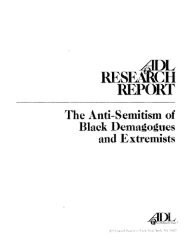You also want an ePaper? Increase the reach of your titles
YUMPU automatically turns print PDFs into web optimized ePapers that Google loves.
Document . Results<br />
o<br />
o<br />
Page 5 of8-<br />
Reviving Gulf defense. Over the past several years, fears of a rising Tehran have begun to drive many<br />
Arab Gulf countries toward accommodation with Iran. For example, such concerns led Oman to establish<br />
a modus vivendi with the Islamic Republic through the codification of a sweeping agreement on military<br />
cooperation in 2000 (albeit one that has since been denied by Oman). (27) Kuwait subsequently followed<br />
sUit, striking a similar bargain In October 2002., (28) Even Saudi Arabia, preViously a strategic competitor<br />
of Iran, capitulated on a long-discussed framework accord with Tehran in late 2001, in the wake of two<br />
multi-billion-dollar Russo-Iranian defense accords. (29)<br />
But for many of these countries, such bilateral partnerships are a product of necessity--a function of ttie<br />
inadequacy of national defenses and regional alliances In addressing Iran's rising expansionism. The<br />
distrust of Iran still runs very deep. As a recent editorial in London's influential·Arab-language Ash-Sharq<br />
al-Awsat newspaper emphasized, Iran now poses a threat to "Saudi Arabia, Oman, Iraq, Afghanistan,<br />
Turkmenistan, and Azerbaijan, which share with Iran a land border of 5,400 kilometers and a sea border<br />
of 2,400 kilometers .,. The Iranian nuclear danger threatens us, first and foremost, more than it<br />
threatens the Israelis and the Americans!' (30)<br />
\, Such worries have prompted the six-member Gulf Cooperation Council (GCC), comprised of Saudi<br />
Arabia, Kuwait, Oman, Qatar, Bahrain, and the United Arab Emirates, to initiate a feasibility study for an<br />
alliance-wide antimissile system. At the same time, individual countries in the Arab Gulf (most notably<br />
Saudi Arabia and Kuwait) have initiated efforts to upgrade their individual missile defense capabilities.<br />
(31) Recently uncovered nuclear contacts between Saudi Arabia and Pakistan suggest that at least one<br />
of Iran's neighbors has begun to actively contemplate the need for a strategic deterrent against the<br />
Islamic Republic. (32)<br />
All this suggests that a U.S. strategic initiative toward the Arab Gulf may find ready customers. On the<br />
one hand, a deepening of Washington's bilateral military dialogue and defense contacts with individual<br />
Gulf nations might lessen regional dependence not only on .Iran but on an increasingly volatile and<br />
unpredictable Saudi Arabia as well. (33) On the other hand, the creation of a formalized American<br />
security architecture over the region could reinvigorate Washington's regional partnerships while<br />
excluding and isolating Iran. (34) Common to all of these efforts is the need to prOVide Tehran's<br />
neighbors with the tools to counter its growing potential for nuclear and ballistic missile blackmail.<br />
Talking Turkey. Ties between the United States and Turkey have been tepid since Ankara's unexpected<br />
refusal to grant basing rights to U.S. troops on the eve of the spring 2003 Iraq cam'paign--a move that<br />
torpedoed U.S. plans for a northern front against Hussein's regime. Since then, however, policymakers in .<br />
both countries have begun to mend fences. As· part of that process, the United States should insist that<br />
Turkey do more to hedge Iranian ambitions in the Caucasus and Central Asia.<br />
Unfortunately, Turkey's historic role as a strategic competitor of Iran has been substantially eroded.<br />
Indeed, over the past two years, Ankara has steadily drifted toward a new relationship with Tehran.<br />
Much of this movement has been underpinned by energy. Turkey's growing dependence on Iran--which<br />
could provide roughly 20 percent of total Turkish natural gas consumption by the end of the decade<br />
(35)--has diminished Ankara's economic leverage vis-a-vis Tehran.<br />
But politics play an important role as well. Since Its assumption of power in November 2002, Turkey's<br />
Islamist Justice and Development Party (AKP) has gravitated toward closer ties with its Muslim neighbors<br />
under the guise of an '·independent'· foreign policy, Iran has been one of the chief beneficiaries of these<br />
overtures, and bilateral contacts and economic trade between Ankara and Tehran have ballooned over<br />
the past year. This political proximity has only been reinforced by common worries over Iraqi instability<br />
in the aftermath of Hussein's ouster.<br />
Nevertheless, Ankara's deep ethnic and historical ties to the countries of the Caucasus and Central Asia<br />
make it a natural counterweight to Iranian-sponsored religious radicalism In those regions. Given<br />
Turkey's deep interest in expanding trade and development in the Caspian, Turkey also remains<br />
suspicious of Iran's maneuvers there. Meanwhile, Tehran's ongoing sponsorship of terrorism, including<br />
the Kurdish variety, has put Iran and Turkey on very different sides of the war on terrorism.<br />
These commonalities have led observers to suggest that Turkey's most constructive role might be as a<br />
force multiplier for U.S. interests in its "northern neighborhood." (36) In fact, Ankara and Tehran's<br />
divergent strategic priorities--on everything from Central Asian Islam to Caspian energy to the future<br />
political composition of postwar Iraq--suggest that Turkey and Iran could become competitors again. The<br />
United States should encourage such competition by creating incentives for Turkey to play Its historic<br />
https:/lw3.1exis.com/lawenfsolutions_securedlsearchfonns/doBrowse.asp?SearchInfoID=... 11118/2004




